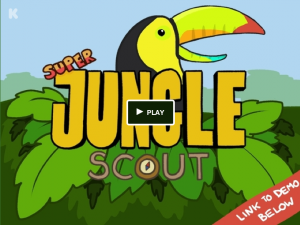Brian Franco wants to make a free educational game for the world to use and if there is anyone to blame, it’s probably his parents.
“In my house, my parents jumped on the opportunity to use these video games as an educational tool as well. In fact, my first “computer” (a Commodore 64 my dad had), was something they used to teach me the alphabet, with Donald’s Alphabet Chase. I can also recall learning about Dinosaurs and how to play Chess, amongst other things, before I was even in school,” he recently told us.
“Super Jungle Scout is simply a natural progression to all of this, as something I can make now as a web developer and illustrator (and inspired by yet another game I played as a child).”
There are lots of lists out there (who doesn’t love a list on the Internets?) about how to run an effective Kickstarter or Indiegogo campaign, including on Forbes.com and Wired.
For Franco, the idea of using crowd-funding served two goals for this independent developer – raise money and build an audience for the product.
“The end goal for the project is to get it into the hands to as many parents/teachers out there as possible,” he said. “With crowd sourcing you basically are taking out two birds with one stone: it helps in funding the project you want to build, and getting it straight into the hands of the very people that you want to have the game.”
But he also had $5.5 million inspiration.
“Reading Rainbow is another great example of something I grew up with as a kid, but don’t see a modern alternative for. It’s the kind of thing that makes you wonder, ‘Have times really changed that much?’” he said. “If you see, the answer is clear. The Reading Rainbow generation, most of which probably have their own little bookworms now, still retain that passion from before and have given the project their overwhelming support. Of course, Reading Rainbow has a huge name to it already, but a love for education clearly still lies within us, and so I thought it was as good as time as ever to bring out a similar idea of my own.”
So Franco dived into planning his campaign and took to the Internet for advice. He said he found an enormous number of tips.
And his strategy sounds informed by many of those recommendations.
“Your initial supporters will come from family and friends. Let everyone know you’re working on the project, ask them to share, see how far that gets you. The next level is to begin approaching all the online parties that would benefit from or be interested in a project like yours,” he said as advice for other developers. “Similarly, you then begin approaching places within your community (or in the communities that friends may have brought you in contact with) to try and gain support there as well.”
The campaign has attracted some support – 17 backers – but remains far short of its $15,000 goal. Franco admitted it is a hard road to travel.
“Admittedly, and almost unsurprisingly, drumming up support is a lot harder than it seems. However, everyone I’ve talked to about the project has expressed great interest in the idea,” he said.
“The key of course, will be how many people actually discover the project and support it, which is a task I’m sure will keep me quite occupied for the rest of the month.”

